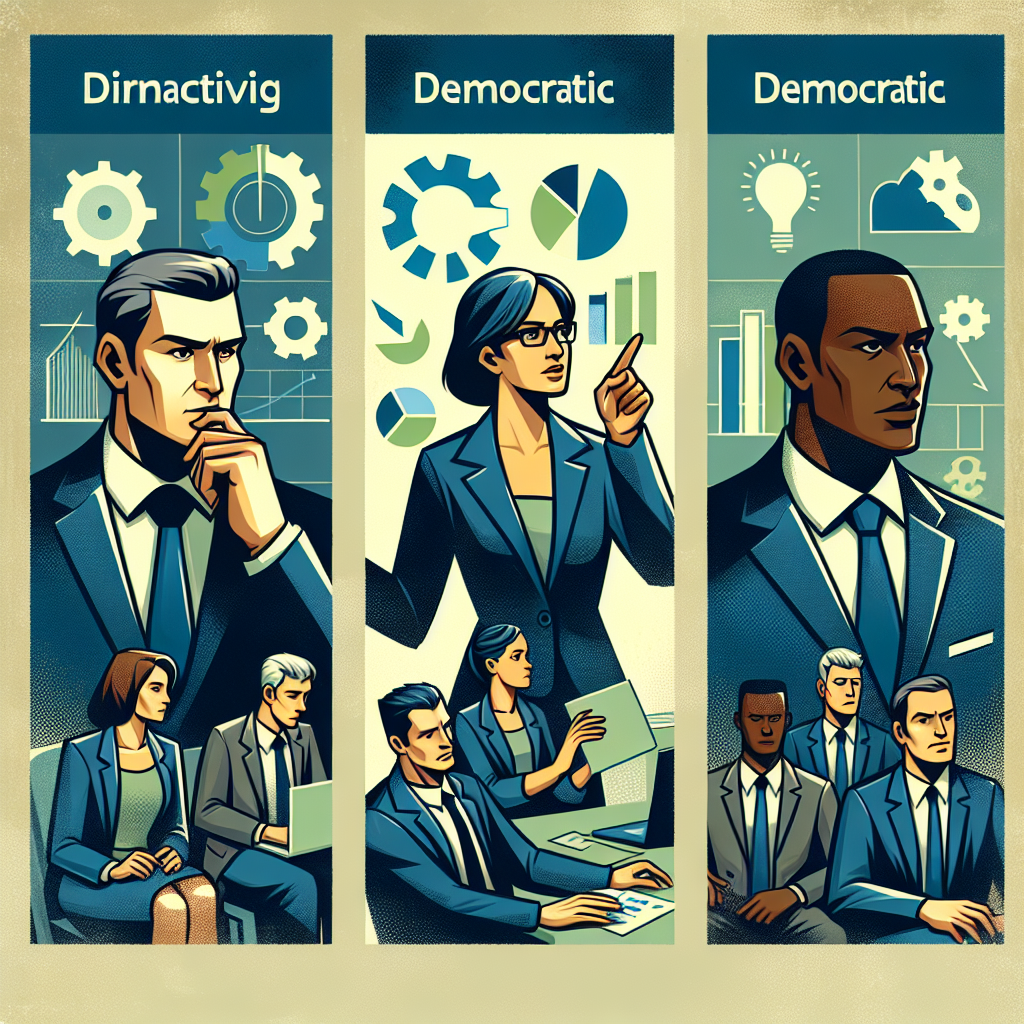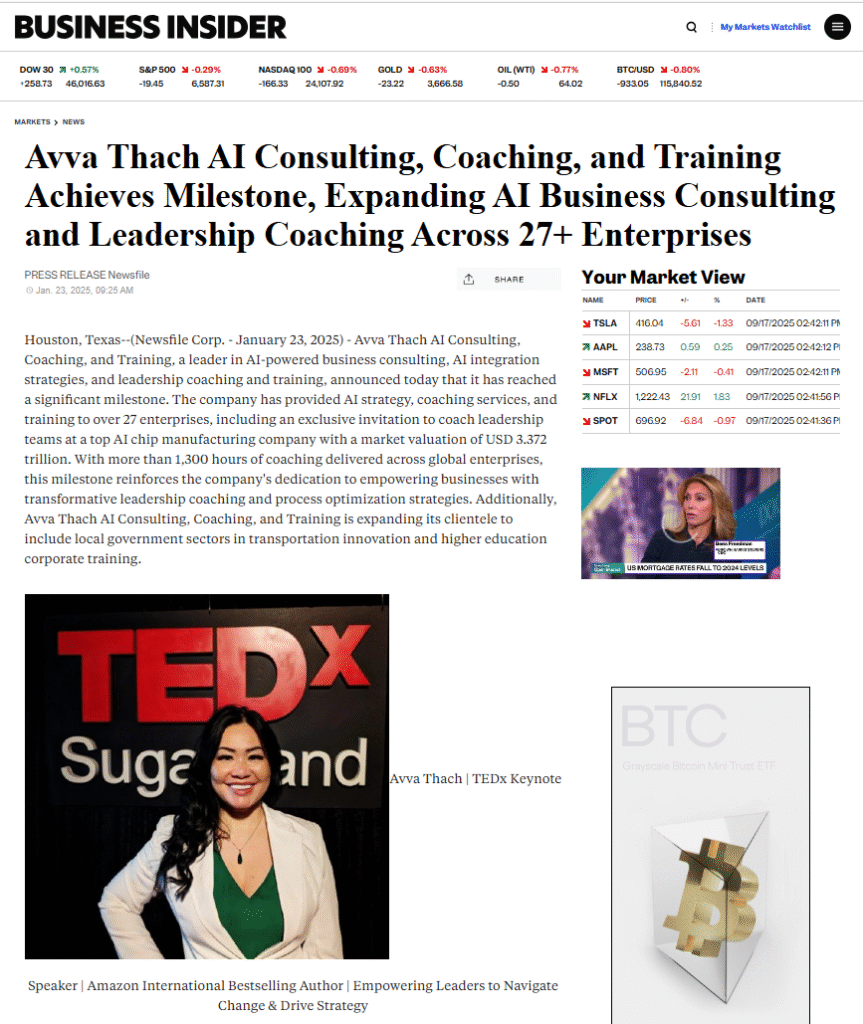Building Future-Ready Teams: A Leader’s Guide to AI Integration
Introduction
Welcome to the thrilling world of leadership in AI, where the future is not just bright; it’s positively glowing with potential! As we stand on the brink of a digital revolution, the integration of artificial intelligence into leadership practices isn’t just a trend it’s becoming a necessity. Leaders today are not only expected to make strategic decisions but also to navigate the complexities brought about by AI technologies.
Imagine leading a team that can predict market trends before they even happen, or making executive decisions backed by real-time data analytics. Sounds like something out of a sci-fi movie, right? Well, buckle up because this is the reality we’re heading towards! The future of leadership in AI is all about harnessing technology to enhance human capabilities, creating a symbiotic relationship between leaders and their AI counterparts.
However, diving headfirst into this brave new world comes with its own set of challenges. From ethical considerations to adapting traditional leadership skills for an AI-driven environment, it’s clear that the role of leaders is evolving faster than you can say “machine learning.” In this guide, we’ll explore effective AI leadership strategies, essential skills for navigating this landscape, and how to cultivate teams that are not just ready for the future but are actively shaping it.
Did you know? The AI market is projected to reach .59 trillion by 2030. This staggering growth underscores the importance of integrating AI into your leadership strategy now!
So grab your virtual toolkit as we embark on this journey to build future-ready teams equipped with cutting-edge AI expertise. Are you ready to transform your leadership approach? Let’s dive in!

The Importance of Leadership in AI
As we plunge headfirst into the digital age, the importance of leadership in AI can’t be overstated. Think of AI as the new kid on the block smart, capable, and full of potential but also a bit unpredictable. Just like any new technology, it needs wise guidance to flourish. Here’s why leadership is crucial for steering the ship in this brave new world.
Setting the Vision
Incorporating AI into an organization isn’t just about deploying algorithms and shiny new tools; it’s about crafting a vision that aligns with your business goals. Leaders in artificial intelligence must articulate how AI can transform operations, enhance customer experiences, and drive innovation. This vision serves as a beacon for teams navigating through complex AI projects.
Fostering a Culture of Innovation
AI thrives on experimentation and learning from failure. Leaders who encourage a culture of innovation empower their teams to take calculated risks think of it as giving them permission to play with fire (safely!). This kind of environment is essential for discovering how to best leverage machine learning and other AI technologies.
Building Diverse Teams
Diversity in AI leadership isn’t just about ticking boxes; it’s about harnessing varied perspectives that lead to better decision-making and more innovative solutions. Women in AI leadership roles are vital for creating inclusive strategies that consider different user needs and ethical implications. In fact, companies with diverse teams are 35% more likely to outperform their competitors!
Navigating Ethical Considerations
The rapid advancement of artificial intelligence raises significant ethical concerns from data privacy issues to algorithmic bias. Leaders must take proactive steps towards ethical leadership in AI by implementing frameworks that ensure responsible use of technology. This not only builds trust but also mitigates risks associated with misuse.
Adapting Leadership Styles
The future of leadership in AI requires adaptability think chameleons rather than dinosaurs! Leaders need to embrace adaptive leadership styles that incorporate human-centric approaches while leveraging data analytics for effective decision-making with AI tools. This balance is key to integrating AI into organizational strategy without losing sight of the human element.

Conclusion: The Road Ahead
The impact of AI on leadership roles will only grow as technology evolves. Future-ready leaders equipped with artificial intelligence expertise will be at the forefront, driving digital transformation initiatives that enhance productivity and innovation. By cultivating change management skills for AI projects and embracing collaborative leadership with artificial intelligence tools, organizations can thrive amidst disruption.
Understanding AI and Its Impact on Leadership
Welcome to the brave new world where artificial intelligence isn’t just a buzzword; it’s a game changer for leadership. The landscape of leadership in AI is evolving faster than you can say “machine learning.” Let’s break down what this means for those at the helm of organizations.
Defining Artificial Intelligence Leadership
Artificial intelligence leadership is about more than just implementing algorithms; it’s about fostering a culture that embraces technology. Leaders in this space need to not only understand AI but also how to leverage it to drive organizational goals. This requires a blend of technical knowledge and soft skills, creating a new breed of leaders who are as comfortable discussing data as they are inspiring teams.
The Role of AI in Executive Leadership
AI is reshaping executive leadership by providing tools that enhance decision-making processes. Consider this: with data analytics powered by AI, leaders can make informed decisions that were once based on gut feelings or outdated reports. This shift towards data-driven decision-making is crucial for maintaining competitive advantage in today’s market.
Did you know? According to recent studies, companies utilizing AI-driven insights see a 20% increase in operational efficiency! Now that’s something to cheer about!
Impact of AI on Traditional Leadership Roles
The integration of AI into leadership roles challenges traditional paradigms. No longer are leaders merely the keepers of knowledge; they must now also be adept at managing hybrid teams where humans and machines collaborate seamlessly. This leads us to the concept of adaptive leadership and artificial intelligence, where flexibility and responsiveness become key traits for success.
- Human-Centric Leadership: Balancing the needs of your team with technological advancements.
- Collaborative Leadership: Emphasizing teamwork between human employees and AI systems.
- Diversity in AI Leadership: Ensuring varied perspectives are included in AI discussions enhances creativity and innovation.
A New Era: Transformational Leadership with AI
The future of leadership in AI isn’t just about keeping up with technology; it’s about transforming how we lead. Leaders must cultivate an environment where innovation thrives, fostering a culture that embraces change rather than fears it. Think of it as being the captain of a ship navigating through uncharted waters where your compass is powered by data and your crew includes both humans and intelligent systems.

The impact of AI on leadership roles is profound, offering both opportunities and challenges. As we look ahead, embracing these changes will be essential for any leader aiming for success in this digital age.
Key AI Leadership Strategies for Future-Ready Teams
As we dive into the realm of leadership in AI, it’s vital to recognize that navigating this landscape requires more than just a sprinkle of tech-savvy. It demands a robust strategy, a dash of creativity, and a commitment to fostering an environment where both humans and machines can thrive together. Here are some key strategies to ensure your teams are future-ready:
-
Leading with Artificial Intelligence: Best Practices
Effective leadership in AI isn’t just about understanding algorithms; it’s about integrating them into your decision-making process. Leaders should:
- Foster a culture of experimentation where teams feel safe to innovate.
- Utilize AI tools to enhance productivity and streamline operations.
- Encourage ongoing learning about AI technologies to stay ahead of the curve.
-
AI-Driven Leadership: Integrating Technology into Strategy
A successful leader must embrace an AI-driven mindset, which involves:
- Aligning AI initiatives with organizational goals to ensure strategic coherence.
- Leveraging data analytics for effective decision-making, turning insights into action.
- Incorporating machine learning models that adapt over time, enhancing executive decision-making processes.
-
Transformational Leadership with AI: Fostering Innovation
The future of leadership in AI is transformational. To cultivate innovation:
- Create cross-functional teams that blend diverse skill sets and perspectives.
- Encourage collaborative leadership by utilizing artificial intelligence tools that facilitate communication and idea-sharing.
- Invest in training programs focused on developing leadership skills in AI, ensuring leaders are equipped to inspire their teams amid digital transformation.

Remember: The impact of AI on leadership is profound; it reshapes how decisions are made and how teams interact. Future-ready leaders will not only harness these technologies but will also prioritize ethical considerations in their implementation. This is essential for building trust within their organizations and the communities they serve.
The key takeaway? Embrace change, foster collaboration, and always keep learning. With the right strategies in place, your team will not only survive but thrive in this exciting new era!
Cultivating Essential Leadership Skills for AI Integration
As we plunge headfirst into the era of artificial intelligence leadership, it’s crucial for leaders to cultivate a unique set of skills that make them not just effective, but also visionary. Think of it like equipping a Swiss Army knife with all the right tools each skill plays a vital role in navigating the complexities of AI integration.
Emotional Intelligence and Artificial Intelligence Integration
First up is emotional intelligence (EI). In a world where machines can analyze data faster than you can say “machine learning,” the human touch becomes invaluable. Leaders must harness their EI to connect with teams on a deeper level, ensuring that AI tools are used to enhance human capabilities rather than replace them. With high EI, leaders can:
- Recognize and manage their own emotions and those of others.
- Foster an environment where team members feel valued and understood.
- Encourage open dialogue about how AI impacts their work.
Change Management Skills for AI Projects
The second skill set revolves around change management. Integrating AI into existing workflows is like trying to fit a square peg into a round hole if you don’t manage the transition well, you’ll end up with chaos instead of synergy. Leaders must develop strategies that include:
- Communicating the vision and benefits of AI integration clearly.
- Providing training sessions that equip teams with the necessary skills.
- Establishing feedback mechanisms to adjust strategies based on team input.
Diversity in AI Leadership: Leveraging Varied Perspectives
Diversity isn’t just a buzzword; it’s a game-changer in leadership roles, especially when it comes to leading with artificial intelligence. A diverse leadership team brings varied perspectives that enhance problem-solving and innovation. To leverage this diversity effectively, leaders should:
- Encourage diverse hiring practices within tech teams.
- Create inclusive environments where all voices are heard during decision-making processes.
- Utilize data analytics to understand how different demographics interact with AI tools.
The future of leadership in AI is bright but requires adaptation and growth. Are you ready to lead your team into this exciting era?
Navigating Challenges in AI Leadership Roles
Welcome to the wild world of leadership in AI, where the stakes are high, and the landscape is constantly shifting! As leaders in artificial intelligence, you’re not just steering a ship; you’re navigating through a storm of challenges that require both finesse and strategy. So, grab your compass, because we’re about to chart a course through these turbulent waters.
Challenges of AI in Leadership Roles: Overcoming Resistance
One of the biggest hurdles you’ll face is resistance to change. Many team members might feel threatened by AI technologies or unsure about their roles in an AI-driven future. This is where your leadership skills in AI come into play. You need to foster an environment that embraces innovation rather than fears it. Think of it like introducing a new flavor of ice cream some will love it, while others might be hesitant. Your job? Convince them to take that first scoop!
Balancing Human and AI-Led Teams for Optimal Performance
Next up is the delicate dance of balancing human and AI-led teams. It’s essential to recognize that while machines can crunch data faster than you can say “machine learning,” they lack the emotional intelligence that humans bring to the table. This is where human-centric leadership in AI shines. You must ensure that your teams collaborate effectively, leveraging both human creativity and AI efficiency. Think of it as a buddy cop movie AI is the no-nonsense detective who gets results, while humans are the charming partner who knows how to navigate complex social dynamics.
Ethical Leadership in AI: Establishing Trust and Responsibility
Finally, let’s talk ethics because with great power (and great algorithms) comes great responsibility! Ethical leadership in AI isn’t just about compliance; it’s about establishing trust with your team and stakeholders. You need to communicate transparently about how AI tools will be used and ensure they align with your organization’s values. Remember, if people don’t trust your intentions, they won’t trust your technology.
Key Takeaway: Navigating challenges in leadership roles within the realm of artificial intelligence requires overcoming resistance, balancing human-AI collaboration, and fostering ethical practices. Equip yourself with adaptive leadership strategies to thrive!
The Future of Leadership in the Age of AI
As we stand on the brink of a new era, the future of leadership in AI is not just a buzzword; it’s a necessity. The integration of artificial intelligence into leadership roles is reshaping how we think about decision-making, team dynamics, and organizational strategy.
Imagine a world where leaders are not just decision-makers but also data interpreters. With AI-driven insights, executives can make informed choices that enhance productivity and foster innovation. This shift requires future-ready leaders who are not only tech-savvy but also possess strong interpersonal skills to manage human-AI collaboration effectively.
- Future-ready leaders with artificial intelligence expertise: Leaders must embrace continuous learning to understand AI’s capabilities and limitations. This knowledge empowers them to leverage AI tools for strategic advantage.
- The evolving landscape of strategic leadership and AI integration: Traditional leadership models are being challenged by AI’s analytical prowess. Leaders need to adapt their strategies to incorporate data-driven decision-making while maintaining a human-centric approach.
- Cultivating collaborative leadership with artificial intelligence tools: Successful leaders will foster environments where teams collaborate with AI systems seamlessly. This involves redefining roles and responsibilities to include both human intuition and machine efficiency.
Moreover, as we look toward the future, ethical considerations in AI leadership cannot be overlooked. Leaders must prioritize transparency and accountability while navigating the complexities of AI implementation. This means establishing clear guidelines for responsible use of technology that respects privacy and promotes diversity.
Key Takeaway: Embracing leadership in AI means developing a balanced approach that integrates technology with emotional intelligence, fostering innovation while upholding ethical standards.
Conclusion
As we plunge headfirst into the digital age, the importance of leadership in AI can’t be overstated. Leaders must guide the integration of AI into organizations, set visions, foster innovation, build diverse teams, and navigate ethical considerations.
” } }, { “@type”: “Question”, “name”: “What skills are essential for leaders in AI?”, “acceptedAnswer”: { “@type”: “Answer”, “text”: “
Essential skills for leaders in AI include emotional intelligence, change management expertise, and embracing diversity. These skills prepare leaders for the challenges posed by AI and position them as forward-thinking pioneers.
” } }, { “@type”: “Question”, “name”:”How can leaders balance human and AI-led teams?”, “acceptedAnswer”:{ “@type”:”Answer”, “text”:”
Leaders must ensure that teams collaborate effectively by leveraging both human creativity and AI efficiency. It involves creating environments where humans and machines work together seamlessly.
” } } ] }, { “@type”:”SpeakableSpecification”, “@id”:”https://iavva.ai/leadership-in-ai-future-ready-teams#speakable1″, “_speakableType”:”websiteContentType#speakableTextSelection” } ] }





















Leave a Reply